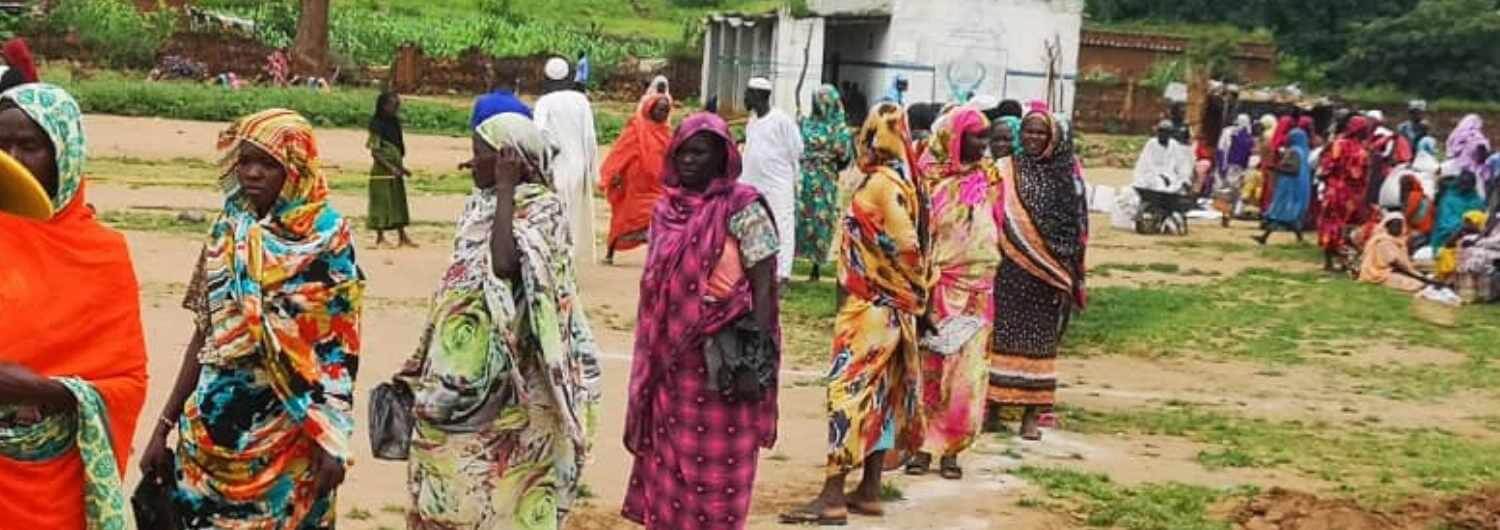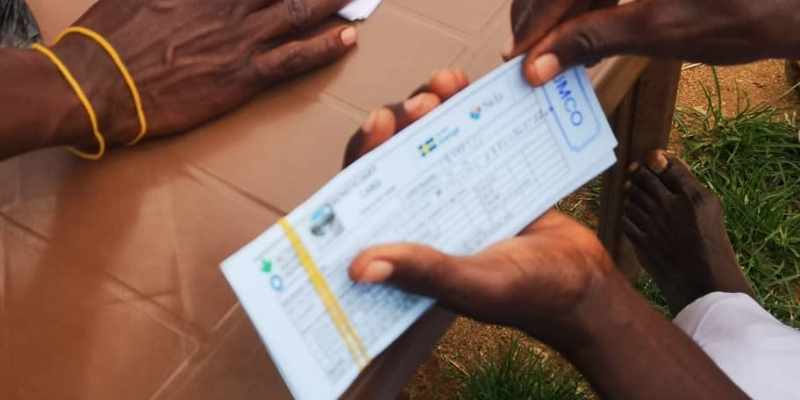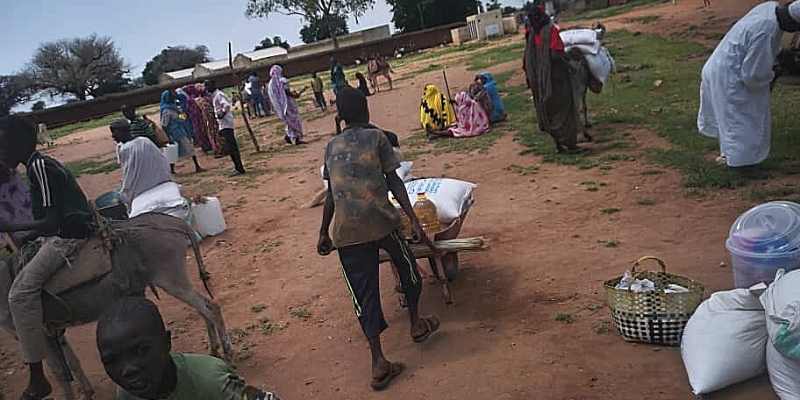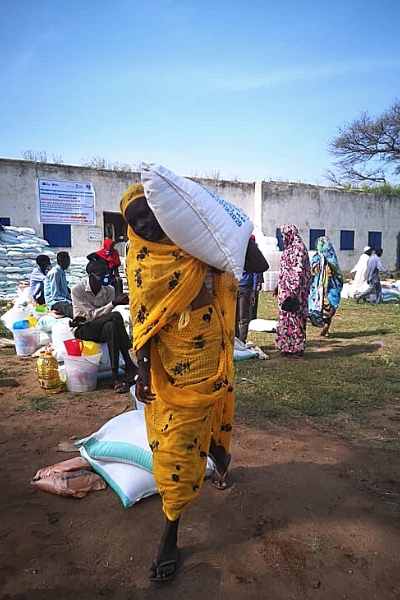Stories
Sudan: answering to the emergencies by COVID and floods

Adam Ali Fadlal
Adam, in his 60s (he does not know his exact age), lives in Dabattukul Arsi village, Guli Tendalty. He has 11 children and grandchildren and is a farmer.
His family was one of 3,000 who received hygiene and dignity kits as part of our response to COVID-19, funded by GFFO, and one of 470 families who received tents and plastic sheeting as part of the emergency response by the 2020 floods, financed by the Swedish Cooperation (Sida).

I was born in this town and have lived here all my life.
I have a very small piece of land for agriculture, the rest I have to rent. I grow sesame (sim sim), peanuts, wheat. What I harvest is not enough for my consumption, much less to sell.
The biggest challenge for us to live in this area is the lack of water. This directly affects our food security. As a result, I don't have enough money to buy clothes for my family.
Our town is flooded due to excessive rain. We flood almost every year. The floods keep increasing more and more every year. This year was the worst flood we have ever faced, it destroyed everything. Our rooms, our belongings, our farmland, everything.

This year due to COVID-19 things have been more difficult. We are very afraid of getting infected. In the first months we didn't even go into the city to go shopping and everything, as it is very busy.
If there is water, we can wash our hands with soap. Now we don't have soap. No water, no soap. There is no bathroom. There is a bathroom in the village, it belongs to the mosque. We wait
My grandchildren contracted malaria, diarrhea, and fever in the past few weeks. We had to carry them on our shoulders and carry them to Kosti.
The tent we received was very useful for us, it protected us from the cold weather. Drums have also been very useful for transporting water with donkeys.
Preparing before disasters is very difficult for us because we don't have the means. Most of our houses are made of mud, they must be protected from floods.
A tank connected via pipes to the river would solve our long-term water problems. We just need resources, in our community we know how to build all these things.
Fatima Ahmed Fadlallah
Fatima, 65, lives in Tamakkanat village in Guli town in Sudan's White Nile state. His family was one of 3,000 families who received hygiene and dignity kits as part of our response to COVID-19, funded by GFFO, and one of 470 families who received tents and plastic sheeting as part of the emergency response. for the 2020 floods, financed by the Swedish Cooperation.

I was born in this town, I got married here and I have spent my whole life here.
I have 8 children (4 boys, 4 girls) and 3 grandchildren. My youngest son lives with me, he is not yet married. My husband passed away 10 years ago. After his death, I began to earn a living cultivating. However, due to our financial situation, I was unable to continue with my children's children and my children, who had to drop out of school one by one. My youngest son dropped out of school and started helping out doing farm jobs, which he has continued ever since.
Life is very difficult now in this town. Before we were fewer inhabitants and the available resources were adequate. For example, if we wanted firewood, it was close. And the competition for water was not that strong. Now, with the increase in population size, competition for water and firewood is very high and resources have become scarce. This season all the crops are flooded. We have land that we share with other families, it is about 4-5 km away. Before we could get 15 bags of sesame or sorghum. We could even sell something on the market after keeping something for home consumption (which we could use for 1 year) in case we need money to pay for any treatment of the treatment. But this season we have not been able to harvest anything.

I was born in this town, I got married here and I have spent my whole life here.
I have 8 children (4 boys, 4 girls) and 3 grandchildren. My youngest son lives with me, he is not yet married. My husband passed away 10 years ago. After his death, I began to earn a living cultivating. However, due to our financial situation, I was unable to continue with my children's children and my children, who had to drop out of school one by one. My youngest son dropped out of school and started helping out doing farm jobs, which he has continued ever since.
Life is very difficult now in this town. Before we were fewer inhabitants and the available resources were adequate. For example, if we wanted firewood, it was close. And the competition for water was not that strong. Now, with the increase in population size, competition for water and firewood is very high and resources have become scarce. This season all the crops are flooded. We have land that we share with other families, it is about 4-5 km away. Before we could get 15 bags of sesame or sorghum. We could even sell something on the market after keeping something for home consumption (which we could use for 1 year) in case we need money to pay for any treatment of the treatment. But this season we have not been able to harvest anything, we have no latrines in the village and most of us defecate in the open, around the trees. Now we are digging our waste and using soap (after SANTOLIC activities launched by the government and NGOs like Action Against Hunger in association with CAFA). For girls and women, it is more comfortable to have latrines in or near the house rather than going outside, especially if they are ill and have health problems such as diarrhea.
We all help each other in our community, especially for those whose homes have been destroyed.
My only wish for the rest of my life is to perform the Hajj (Muslim pilgrimage in Saudi Arabia, one of the five pillars of Islam).
JOIN US
Donate now
Your donation will reach those who most need it
Become a member
Join the generation that can bring an end to hunger
Donate via SMS
send HAMBRE to:
- 28010(1.2€)
- 38010(6€)
- 38012(3€)
Full donation to our projects. Valid for Movistar, Vodafone, Orange and Yoigo